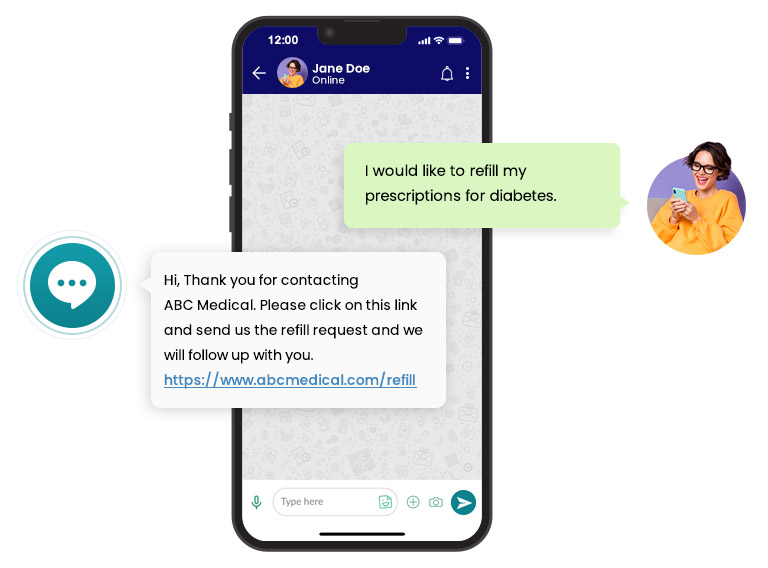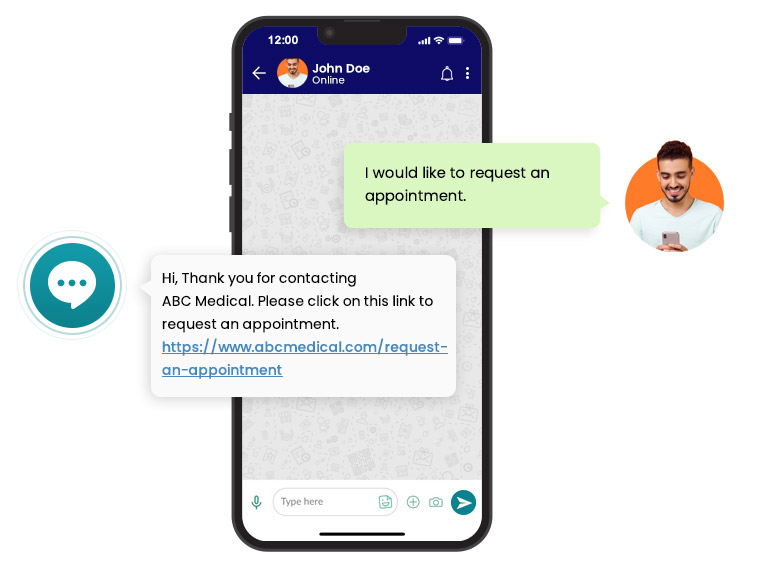TCPA Compliance Text Messaging for Patient Marketing
TCPA stands for the Telephone Consumer Protection Act. It’s a US federal law that places restrictions on unsolicited telemarketing calls, text messages, and faxes.
Key Provisions of TCPA Compliance:
- Prior Express Written Consent: Businesses must obtain explicit written consent from consumers before making sales calls, sending text messages, or faxes.
- Do-Not-Call Registry: Companies cannot call numbers on the National Do Not Call Registry.
- Automated Dialers (Autodialers): Using autodialers to call cell phones or other wireless devices is generally prohibited without prior express written consent.
- Text Messaging: Sending unsolicited text messages is illegal without prior express written consent.
- Faxes: Unsolicited commercial faxes are prohibited, with exceptions for established business relationships.
PatientGain’s auto response texting app is designed to convert more patients for your medical practice. Some examples include:
Refill: Texting app responds with steps on how to request the refill
Appointment: Texting app responds with steps on how to request the appointment
Hours: Texting app responds with business hours and when clinic closes today
Directions: Texting app responds with Google map link

Reduce phone tag by providing patients with a textable number where they can easily send questions and concerns. Turn website visitors into new patients. Increase appointment bookings and capture patient demand by enabling patients to chat with your staff directly on your website.

Decrease dropped calls, long hold times, and in-office delays by prompting patients who call to start a text conversation instead. Conversational patient texting engagement apps help your practice increase operational efficiency and improve the patient experience.
TCPA Compliance for Medical Practices
Table of Contents:
- Key Points to Remember
- Key Features of HIPAA-Compliant Texting Apps
- Benefits of Using HIPAA-Compliant Texting Apps
- Common Challenges and Considerations
- Best Practices for TCPA Compliance
- Penalties for Non-Compliance
- Conclusion
The Telephone Consumer Protection Act (TCPA) regulates telemarketing calls, auto-dialed calls, prerecorded calls, text messages, and unsolicited faxes. For medical practices, TCPA compliance is essential to maintain patient trust, avoid legal penalties, and ensure efficient communication. While there are specific exemptions for healthcare providers, these do not mean complete exemption from TCPA regulations.
Key Points to Remember
- Healthcare Exemption:
- Medical practices can send text messages, emails, or make calls related to patient care, appointment reminders, treatment updates, or other healthcare-related matters without obtaining prior express written consent.
- Patient-Provided Information:
- Communications must be sent to the phone number or email address provided by the patient.
- No Marketing or Sales:
- Communications must be strictly healthcare-related and cannot include any promotional or financial solicitations.
- Opt-Out Option:
- Patients must have a clear and easy way to opt out of future communications.
- HIPAA Compliance:
- While TCPA focuses on telecommunications, medical practices must also comply with HIPAA regulations to protect patient privacy.
Key Features of HIPAA-Compliant Texting Apps
- Encryption: All messages and data are encrypted to protect against unauthorized access.
- Authentication: Strong authentication methods (e.g., two-factor authentication) are required.
- Data Privacy: Patient information is stored securely, and access is restricted to authorized personnel.
- Compliance: The app adheres to HIPAA regulations and other relevant privacy laws.
- Audit Trails: Activity logs are maintained to track access and modifications to patient data.
- Access Controls: Limits access to authorized users only, with secure login credentials and user authentication.
- Data Backup: Regularly backs up data to ensure information is not lost.
- Automatic Log-Off: Automatically logs users out after a period of inactivity to prevent unauthorized access.
- Secure File Sharing: Allows for the safe exchange of documents and images containing PHI.
Benefits of Using HIPAA-Compliant Texting Apps
- Enhanced Security: Protects patient information and complies with HIPAA regulations.
- Improved Communication: Facilitates quick and efficient communication between healthcare providers and patients.
- Better Patient Engagement: Enables patients to communicate easily with their healthcare providers, leading to improved patient satisfaction and outcomes.
- Increased Efficiency: Reduces phone tag and missed messages, saving time for both providers and patients.
- Compliance Assurance: Helps medical practices maintain compliance with HIPAA regulations, avoiding potential fines and penalties.
Common Challenges and Considerations
- Defining Healthcare-Related:
- Determining what constitutes a healthcare-related message can be complex.
- Patient Consent:
- While not required for healthcare-related communications, obtaining explicit consent for marketing or non-treatment-related messages is essential.
- Automated Systems:
- Using autodialers or prerecorded messages for healthcare-related calls might still require specific exemptions or consent.
- Text Messaging:
- While convenient, text messaging can pose challenges related to message length, content, and documentation.
Best Practices for TCPA Compliance
- Develop Clear Communication Policies:
- Define what constitutes healthcare-related communication and establish guidelines for patient interactions.
- Document Consent:
- Even for healthcare-related communications, consider documenting patient consent to build a stronger compliance posture.
- Train Staff:
- Ensure employees understand TCPA and HIPAA regulations to avoid violations.
- Monitor and Review:
- Regularly review communication practices to identify potential risks and areas for improvement.
Penalties for Non-Compliance
Non-compliance with TCPA can result in:
- Monetary Fines: Up to $500 per violation, increasing to $1,500 per willful or knowing violation.
- Legal Action: Patients can file lawsuits for TCPA violations, potentially leading to costly litigation.
Conclusion
TCPA compliance is essential for medical practices to maintain patient trust and avoid legal penalties. By understanding and adhering to TCPA regulations and leveraging HIPAA-compliant texting apps, medical practices can ensure efficient, legal, and respectful communication with their patients. Implementing best practices and staying informed about regulatory changes will help practices navigate the complexities of TCPA compliance effectively.
